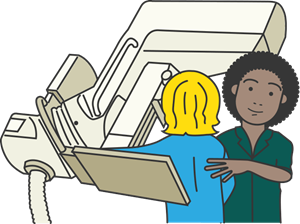Helping students select a career pathway that suits their particular skills and interests can be a challenge. It’s important that they make an informed decision about their future, but if they’re not exposed to the different options, how can they make a choice?

Radiography is a career that combines challenge with an excellent employment package and the rewards of doing something really worthwhile. As key members of a large healthcare team, radiographers provide treatment that helps transform people’s lives.
Radiography is one of 15 allied health professions. The allied health professions are distinct from nursing or medicine and provide direct patient care and support services that are critical to the healthcare system.
There are two types of radiographer
Diagnostic radiographers take the lead responsibility for the management and care of patients undergoing the spectrum of imaging examinations, together with associated image interpretation.
Therapeutic (or therapy) radiographers take the lead responsibility for the management and care of patients undergoing radiotherapy during the pre-treatment, treatment delivery and immediate post-treatment phases. Their role supports patients and their families through the entire cancer journey from health promotion to end of life care.
What makes a great radiographer?
Radiographers work very closely with patients so it’s important to enjoy meeting new people. A great radiographer is:
- Caring and supportive and able to put patients at ease;
- Calm under pressure (for example, dealing with medical emergencies);
- Good at communicating and enjoys working as part of a team;
- Confident working with leading-edge technology;
- Adaptable and has the ability to learn new skills (radiography is constantly changing).
What qualifications are needed?
Entry requirements for school and college sixth forms vary but students will probably need good maths and English GCSE/standard grade passes.
Universities set their own entry requirements so look at their websites for more information. Generally, students will need:
- 240 to 300 UCAS tariff points;
- Good maths and English GCSE/standard grade passes;
- A levels/highers or equivalent in science subjects.
There are 24 universities around the UK approved to offer radiographic education and 14 universities approved to offer radiotherapy education.
Check each university’s specific A level (or equivalent) entry requirements, as there are many differences between courses. Take a look at SoR's directory of university courses:
- Directory of pre-registration programmes
- Directory of post-registration courses
How are the courses funded?
In ENGLAND, If students are starting in September 2016 or Spring 2017, tuition fees will be paid in full by the National Health Service (NHS). They may also receive a means-tested bursary - money to support them in their studies.
Students are advised to speak to the university/universities they're interested in to find out if the course is approved and what financial support they could receive. Find more information on student bursaries at NHS Careers and NHS Student Bursaries.
For students in England starting after 1 August 2017, at this time there is no definitive or official information. Click here for the latest information.
NORTHERN IRELAND tuition fee loans and maintenance grants.
WALES fees and living cost loans.
Encourage students to see for themselves!
It’s important for students to explore both disciplines – diagnostic and therapeutic – before deciding which to study. Some departments and centres hold open days for members of the public who would like to be shown round. Encourage students to contact their local hospital's imaging or radiotherapy department to find out whether any open days are scheduled, or whether they'd allow them to visit on another day? It's a great way to get a ‘feel’ for the environment.
Further information
The majority of radiographers in the UK belong to the Society and College of Radiographers (SCoR), a trade union and professional body.
The SoR is responsible for the professional, educational, public and workplace interests of its members. If you have any specific questions regarding a career in radiography, contact the organisation here.
The NHS Careers website is another useful resource.